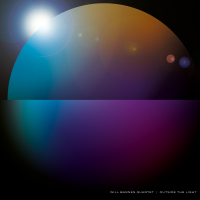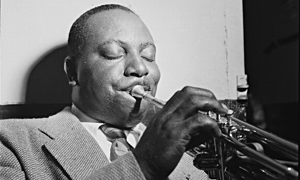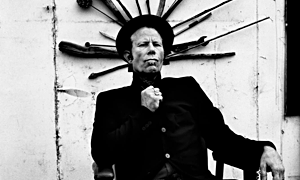Home » Jazz Articles » Book Review » Hard Bop Academy: The Sidemen of Art Blakey and the Jazz...
Hard Bop Academy: The Sidemen of Art Blakey and the Jazz Messengers
 On the album The Jazz Messengers Live at the Cafe Bohemia Volume 1, Art Blakey introduces trumpeter Kenny Dorham by saying that he had played with Charlie Parker "The Prophet of Modern Jazz." If Parker was the prophet, then Blakey was definitely one of its chief apostles. Just take a look at the musicians who formed The Jazz Messengers over the years and you have a veritable who's who of contemporary jazz. Players ranging from Horace Silver to Keith Jarrett, Wynton Marsalis to Chuck Mangione, and Jackie McLean to Wayne Shorter all spent time as Messengers.
On the album The Jazz Messengers Live at the Cafe Bohemia Volume 1, Art Blakey introduces trumpeter Kenny Dorham by saying that he had played with Charlie Parker "The Prophet of Modern Jazz." If Parker was the prophet, then Blakey was definitely one of its chief apostles. Just take a look at the musicians who formed The Jazz Messengers over the years and you have a veritable who's who of contemporary jazz. Players ranging from Horace Silver to Keith Jarrett, Wynton Marsalis to Chuck Mangione, and Jackie McLean to Wayne Shorter all spent time as Messengers. With Hard Bop Academy: The Sidemen of Art Blakey and the Jazz Messengers, Alan Goldsher provides as heartfelt and essential study of the players who comprised this landmark unit. Goldsher, an accomplished bassist who has performed with artists ranging from Janet Jackson to Clark Terry, approaches the subject not only as a musician but a sincere fan. Along with his musical resume, Goldsher has managed to make a name for himself as a writer. He recently published an impressive debut novel, Jam, and is a regular contributor to Bass Player magazine.
Hard Bop Academy provides interesting profiles of many key Jazz Messengers. Each chapter focuses on a particular instrument. Goldsher doesn't aim his discussions at academicians, but music listeners. As he puts it, "You'll dig this book if you think of me as the guy standing next to you in the jazz section of your local record store." This description couldn't be any more accurate. Goldsher utilizes a very accessible, intelligent, and extremely entertaining style. Anyone who picks us this book doesn't have to worry about being bored.
Goldsher also knows how to make perfect use of analogy and metaphor.The title Hard Bop Academy serves as an ideal description of The Jazz Messengers. This group proved to be the launching pad for numerous solo careers. It truly was an educational experience for the many players who passed through over the years. Even though none of the players stayed with Blakey for a lengthy period, their time spent proved invaluable. When a player left, he definitely came out at higher level of performance. The stint, though, was limited. Like going to college, there came a point when it was time to go. Bobby Watson, for example, remembers his final days as a Jazz Messenger: Blakey told him "This isn't the post office, you know."
Besides being a talented musician and writer, Goldsher also is an obvious sports fan. He uses sports analogies effectively to provide a deeper understanding of what the Messengers were like as a unit. Just as an example he says that "Freddie Hubbard was to Lee Morgan what Mickey Mantle was to Joe DiMaggio." He goes on to say that The Messengers "were to jazz what the New York Yankees were/are to baseball."
No one in jazz history captured the essence of hard bop like Art Blakey. He kept The Messengers going until his death in 1990. Through it all, he wanted his listeners to "have a ball." The Jazz Messengers always managed to be enjoyable. Obviously Alan Goldsher picked up on the message.
Tags
PREVIOUS / NEXT
Support All About Jazz
 All About Jazz has been a pillar of jazz since 1995, championing it as an art form and, more importantly, supporting the musicians who make it. Our enduring commitment has made "AAJ" one of the most culturally important websites of its kind, read by hundreds of thousands of fans, musicians and industry figures every month.
All About Jazz has been a pillar of jazz since 1995, championing it as an art form and, more importantly, supporting the musicians who make it. Our enduring commitment has made "AAJ" one of the most culturally important websites of its kind, read by hundreds of thousands of fans, musicians and industry figures every month.



















